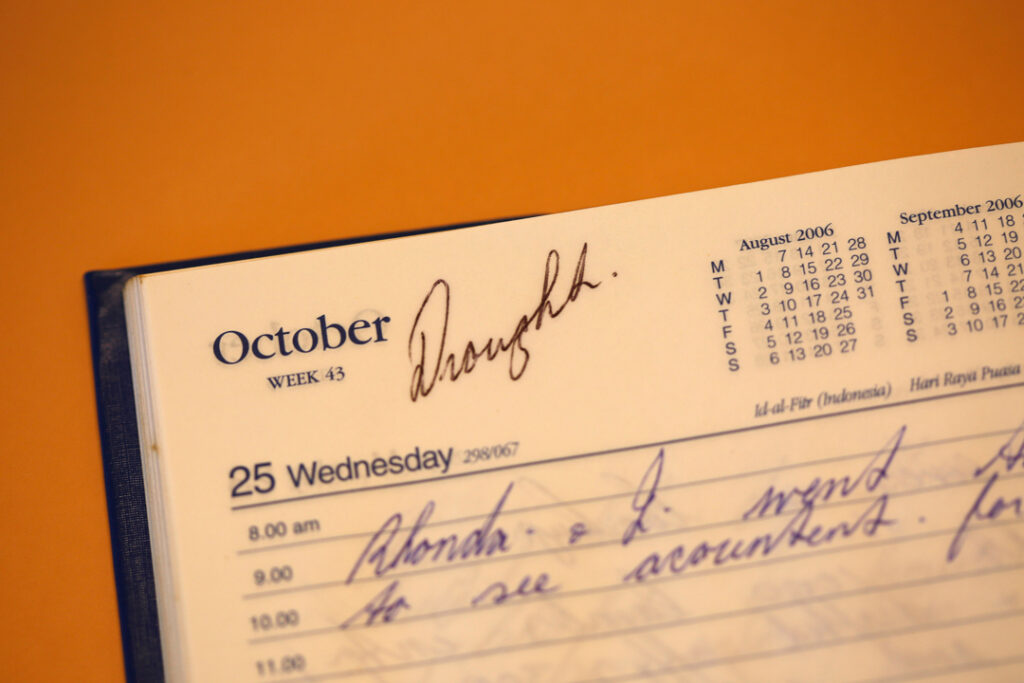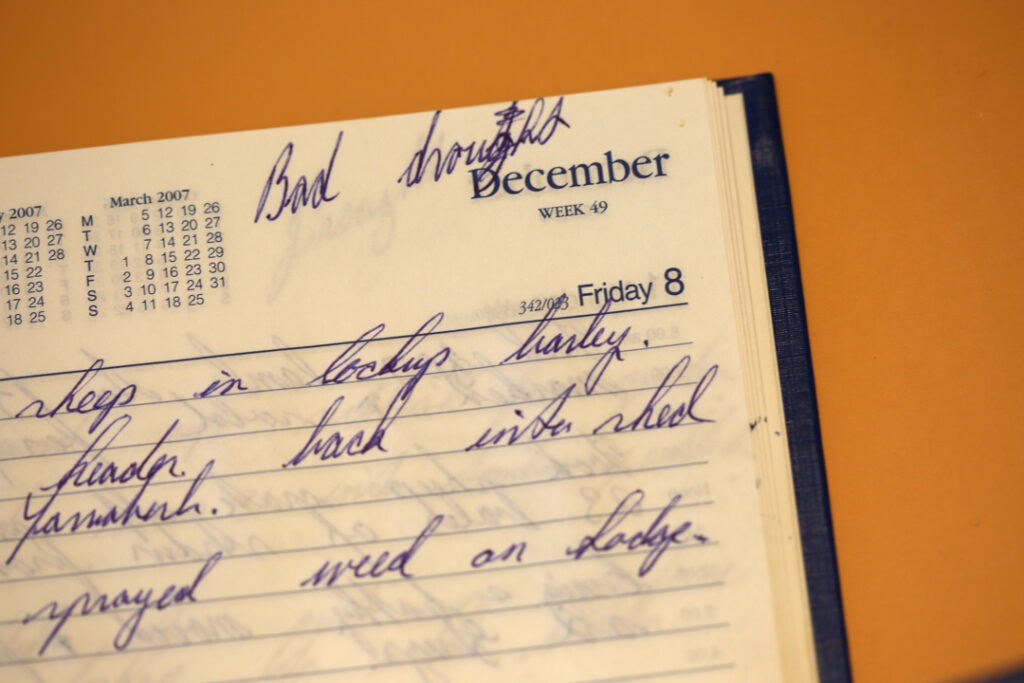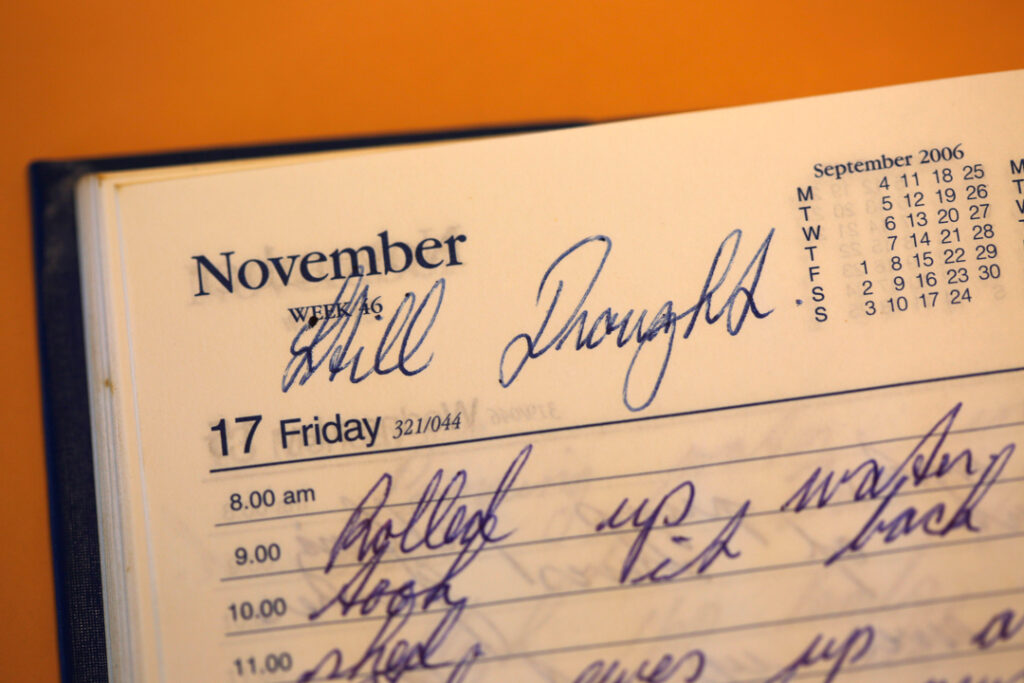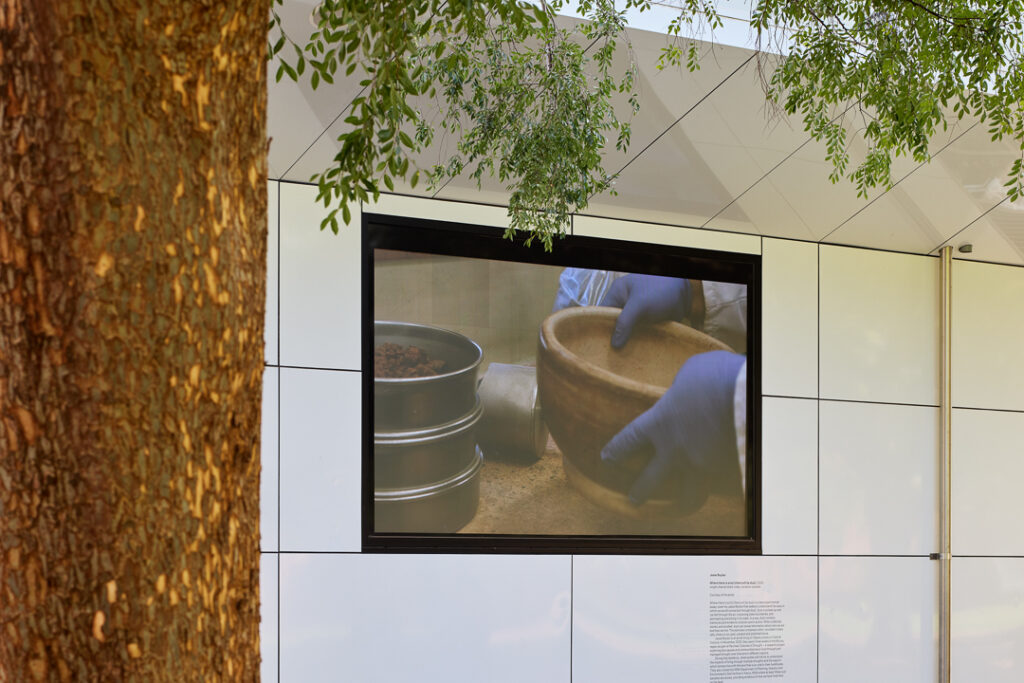- Ponch Hawkes, Wip for Emotional Language of Drought 2023-24
- Ponch Hawkes Wip for Emotional Language of Drought 2023-24
- Ponch Hawkes Wip for Emotional Language of Drought 2023-24
- Ponch Hawkes, Wip for Emotional Language of Drought 2024
- Ponch Hawkes, Wip for Emotional Language of Drought 2023-24
Jacqueline Millner reveals what artist residencies can tell us about the lived culture of drought
How is drought a cultural phenomenon? And were we to augment the scientific and economic frames most used to understand drought, what insights might we yield to help us better imagine, prepare for, and adapt to a changed climate?
These are the questions at the heart of Parched: cultures of drought in regional Victoria, an interdisciplinary ARC-funded project based at La Trobe University over 2021-2024. The project is structured according to both place and time, with a focus on four regions — Albury Wodonga, Mildura, Shepparton, and Bendigo — and four historically significant droughts — Federation, World War II, Millennial and the current event (provisionally dubbed the Tinderbox). As researchers, we acknowledge that difficult questions, such as, how can Australia better respond to the increasingly extreme and frequent weather events associated with climate change, require innovative processes and collaborations. Hence, we structured our research as a genuinely interdisciplinary conversation, with contributions from historians, media studies scholars, literary theorists, climate scientists, and art historians, encompassing a broad range of methods including oral histories, archival research, and visual and literary analysis. In addition, we acknowledge that creative means of exploring experience and communicating ideas have unique capacities to shift established thinking, forge new links, and honour the affective dimensions raised by the research. Hence, working in partnership with regional galleries and arts organisations, we embedded artist residencies in each of the four locales as an integral part of the research.
There is a strong tradition of durational, site-based artistic responses to environmental crises. Artists living among community and place, listening and witnessing with a curious and creative sensibility, may evoke the complexity of the cultural experience of drought to rebut the one-size-fits-all visual stereotypes of cracked earth, animal carcasses and stoic solitary male farmer. Take Still Life: The Food Bowl (2011) by Ken and Julia Yonetani, which emerged from a 3-month residency in Mildura where the artists collaborated with scientists to respond to the environmental degradation of the Millewa Baaka/Murray Darling basin. Focusing on the acceleration of salinity by drought, the artists crafted a cornucopia of food entirely from salt, creating a ghost-like offering of Mildura’s famed local produce, the bounty seductively beautiful, yet ultimately illusory, unsustaining, and unsustainable. In Parched, we were interested in this kind of deeply embodied creative response, for its potential both to decentre our more traditional ways of doing research and to reveal and capture those more elusive imaginaries of drought.
Renowned feminist photographer Ponch Hawkes undertook the Bendigo residency in autumn 2023 at the La Trobe Art Institute. With a long track record of community engagement projects, such as 500 strong (2020-22), which rely on the willingness of participants to disclose intimate aspects of their lives and bodies, Hawkes hoped to focus on the emotional language of drought and its gendered experience. The artist found, however, that her traditional way of working, through photographic portraiture, was not the most apposite to the subject. Instead, teaming up with Karen Twigg, one of the project’s oral history specialists whose settler farming family has deep roots in the region, Hawkes found this rare access to interviewees highly generative. She both observed and complemented Twigg’s interviews, listening with a creative ear, trained over many years as an artist-facilitator, for the affective experience of drought, distilling it in selected quotes. These will form the heart of an installation planned for late 2024 as part of an exhibition that will bring together the research from all the Parched residencies. Viewers will be able to handle these short texts which embody the struggle and adaptation of the East Loddon community during the Millennial drought: the pain felt when children declare they will never return to the farm; the abject despair of those women whose efforts proved in vain when that last little bit of garden green about the house died; the resignation that generations-old farming practices were no longer of any use.
During their spring 2023 residency at MAMA in Albury, photomedia artist Jesse Boylan also drew on the interviews and contacts of a Parched team historian, PhD candidate Rochelle Schoff who grew up in the area and whose focus has been the impact on this community of the World War II drought. Using this material as a point of departure, like Hawkes, Boylan conducted their own interviews with local farmers, excerpting phrases that evoked the experience of drought and its aftermath, including different approaches to land and soil management. Boylan also accessed La Trobe University’s (Albury-Wodonga) research networks, spending time at the NSW Department of Planning, Industry and Environment’s Soil Archive in Yanco, where scientists were delighted to have their work valorised by an outside eye, given that “no one is really interested in dirt”. Boylan’s practice has for some time focused on the ‘slow violence’ of environmental harm, on how invisible, overlooked elements such as air contain traces of our actions and inaction, but also evidence our fundamental interconnectedness. For Parched, Boylan extended this focus to dust, similarly overlooked, linking the scientific process of studying soil to the more personal experiences of living in drought-stricken environments.
Interweaving verbatim material with images and sound recorded during their first encounters with the land, Boylan began assembling a video essay. Its first rushes, titled Where there is wind (there will be dust) after a conversation with livestock and crop farmer Graeme Wenke, were projected on MAMA’s exterior, reflecting the community back to itself through a fresh cipher.
According to Boylan, the Parched residency was “very rare” in funding artistic inquiry as a fundamental part of the research in a large project, in particular because the emphasis was on open-ended research over time. For Hawkes, the on-site residency provided information that would have been otherwise unavailable: the artist heard the voice of the community directly rather than through charts, newspapers and statistics. Acknowledging the artist’s role in imagining and reimagining cultures of drought and plugging in their perspectives to broader conversations on climate crisis, allowed the Parched project novel insights and outcomes, and the capacity to reach more diverse audiences, in a richer emotional language. The residencies also allowed the artists to extend and deepen their practice through close exchanges with disciplinary experts and the chance to “disappear for a little while” and enter the realm of new ideas and material expression while connected to a critical issue of relevance to us all.
See the Parched Project website: parchedresearchproject.com.au
About Jacqueline Millner
Jacqueline Millner is Professor of Visual Arts at La Trobe University, Bendigo, and currently based in Castlemaine. She is part of the interdisciplinary research project Parched: Cultures of Drought in Regional Victoria which is exploring how we can more meaningfully understand drought to help us towards a just climate transition. Visit scholars.latrobe.edu.au/jmillner








Comments
n09eny